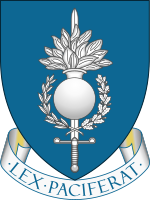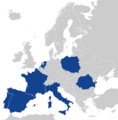European Gendarmerie Force facts for kids
Quick facts for kids European Gendarmerie Force |
|
|---|---|
|
Coat of arms
|
|
| Active | 2006–present |
| Country | |
| Allegiance | |
| Type | Gendarmerie force |
| Size | ~ 800 |
| Motto(s) | "Lex paciferat" (Latin) "The law will bring peace" |
| Colours | Blue |
| Website | eurogendfor.org |
| Insignia | |
| Flag |  |
The European Gendarmerie Force (often called EUROGENDFOR or EGF) is a special group made up of police and gendarmerie forces from different European countries. Think of it as a team of highly trained police officers and soldiers who can quickly respond to problems. Their main job is to help with policing tasks in places where there's a crisis or conflict.
This force was started in 2006 by an agreement between five countries in the European Union (EU): France, Italy, the Netherlands, Portugal, and Spain. Later, Romania joined in 2009, and Poland joined in 2011. Their rules are written down in a special agreement called the Treaty of Velsen from 2007. The main office for EUROGENDFOR is in Vicenza, Italy. It's important to know that EUROGENDFOR is not officially part of the EU, but it can help the EU with its security and defense plans when needed.
Contents
How the European Gendarmerie Force Started
The idea for EUROGENDFOR first came from the French Defence Minister, Michèle Alliot-Marie, in September 2003. She and the Italian Defense Minister, Antonio Martino, shared the idea with other European defense ministers.
Signing the Agreement
The agreement to create the force was signed on September 17, 2004. This happened in Noordwijk, Netherlands, with defense ministers from the five founding countries. On January 23, 2006, EUROGENDFOR was officially opened in Vicenza, Italy, with a military ceremony.
Becoming Fully Ready
EUROGENDFOR was declared fully ready to operate on July 20, 2006. This happened after they completed a successful training exercise. Their first big training exercise took place in France in June 2005.
New Members Join the Force
After Romania joined the European Union, its police force, the Romanian Gendarmerie, wanted to become part of EUROGENDFOR. They first became an observer and then a full member on March 3, 2009. The Polish Military Gendarmerie also wanted to join. They became a full member in December 2011.
What Missions Does EUROGENDFOR Do?
EUROGENDFOR helps with important missions around the world. They often work to bring peace and order to areas in crisis.
Helping in Afghanistan
Since December 2009, EUROGENDFOR has been part of a training mission in Afghanistan. They helped train the Afghan National Police. Members from France, Spain, Netherlands, Poland, Romania, and Portugal taught police officers how to do their jobs. They trained them in special centers and also went with them on missions to offer advice and support. This training helped the Afghan police become better at keeping their country safe.
Helping in Haiti
In early 2010, EUROGENDFOR also went to Haiti. This was after a big earthquake. Their job was to help with security and bring order back to the country after the disaster.
How EUROGENDFOR Works with the EU
It's sometimes confusing, but EUROGENDFOR is not actually an official part of the European Union. It cannot act inside EU countries, including the countries that are part of EUROGENDFOR.
Supporting EU Security Efforts
Even though it's not an EU body, EUROGENDFOR can still help the EU with its security and defense plans. When the EU needs a multinational force (a group of soldiers and police from different countries), EUROGENDFOR can offer its help. This means they work together when there's a big crisis that needs a combined effort.
How EUROGENDFOR is Organized
EUROGENDFOR's main base is in Vicenza, Italy. They have a core group of about 800 to 900 members who are ready to go on a mission within 30 days. They also have another 2,300 members who can be called upon if more help is needed.
Leaders of the Force
The European Gendarmerie Force is led by different commanders from its member countries. These leaders serve for a period of time, usually two years. Here are some of the past and current commanders:
| No. | Portrait | Name | Took office | Left office | Country |
|---|---|---|---|---|---|
| 1 | Brigadier general Gerard Deanaz |
25 January 2005 | 26 June 2007 | ||
| 2 | Colonel Giovanni Truglio |
26 June 2007 | 25 June 2009 | ||
| 3 | Colonel Jorge Estéves |
25 June 2009 | 28 June 2011 | ||
| 4 |  |
Colonel Cornelis Kuijs |
28 June 2011 | 28 June 2013 | |
| 5 |  |
Colonel Francisco Esteban Pérez |
28 June 2011 | 26 June 2015 | |
| 6 | Brigadier general Philippe Rio |
26 June 2015 | 27 June 2017 | ||
| 7 | Colonel Lucian Gavrilă |
28 June 2017 | 27 June 2019 | ||
| 8 | Colonel Giuseppe Zirone |
28 June 2019 | 24 June 2021 | ||
| 9 | Colonel Paulo Jorge Macedo Gonçalves |
25 June 2021 | 27 June 2023 | ||
| 10 | Colonel Hans Vroegh |
28 June 2023 | Incumbent |
Who are the Members of EUROGENDFOR?
Any country that is part of the European Union can apply to join EUROGENDFOR. The existing members must agree for a new country to join.
Current Member Countries
Here are the countries and their police or gendarmerie forces that are currently full members of EUROGENDFOR:
| EU Member State | Institution |
|---|---|
| National Gendarmerie | |
| Carabinieri | |
| Royal Marechaussee | |
| Military Gendarmerie | |
| National Republican Guard | |
| Gendarmerie | |
| Civil Guard |
Why Germany is Not a Member
Germany does not take part in EUROGENDFOR. This is because their country's rules do not allow their military forces to act as police. Instead, Germany works closely with other European police forces through different agreements, like the Prüm Treaty. This treaty helps countries share information and even police officers for certain situations, like dealing with large crowds.
Partner Countries
Some countries are not full members but work closely with EUROGENDFOR as partners:
| EU Member State | Institution |
|---|---|
| Public Security Service |
Observer Countries
Other countries might observe EUROGENDFOR's work, meaning they watch and learn, possibly with the goal of joining later.
| State | Institution |
|---|---|
| Gendarmerie General Command |
Images for kids
See also
 In Spanish: Fuerza de Gendarmería Europea para niños
In Spanish: Fuerza de Gendarmería Europea para niños
- International Association of Gendarmeries and Police Forces with Military Status
- Common Security and Defence Policy
- EU Battlegroup
- Eurocorps
- European Maritime Force
 | James Van Der Zee |
 | Alma Thomas |
 | Ellis Wilson |
 | Margaret Taylor-Burroughs |



